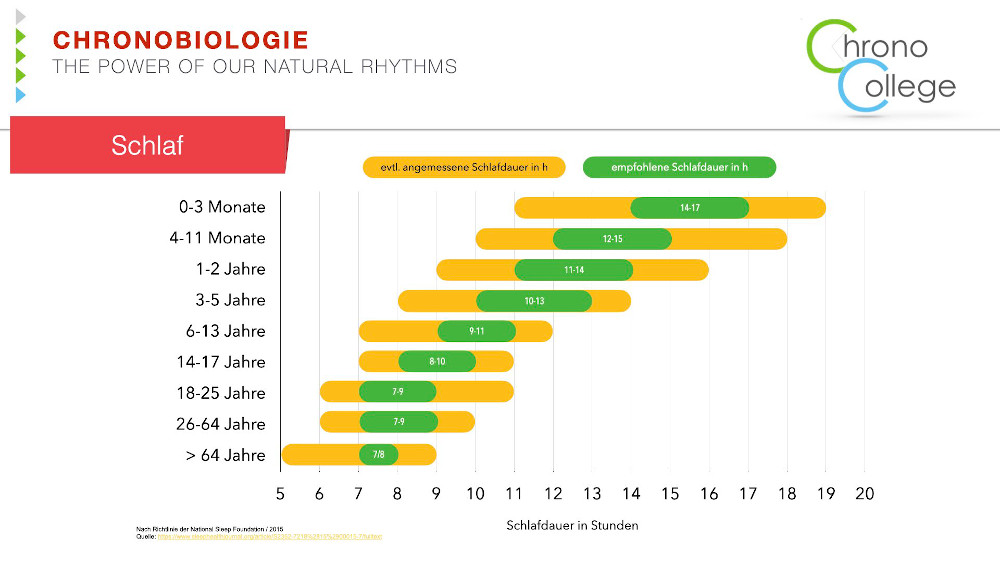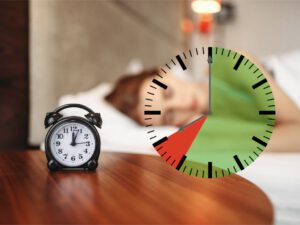Many studies are based around a recommended sleep duration. They all have one thin in common. They ignore the fact that sleep can only do its work when we sleep in. This also applies to this study. More on that in the article linked below.
Original title
National Sleep Foundation’s sleep time duration recommendations: methodology and results summary
Published: 14.01.2015

Our summary
Recommended Sleep Duration – This paper is not a study but a recommendation from the National Sleep Foundation for sleep duration. To this end, an 18-member multidisciplinary panel of experts was interviewed. More on this in the abstract below.

Abstract
“The objective was to conduct a scientifically rigorous update to the National Sleep Foundation’s sleep duration recommendations.
Methods
The National Sleep Foundation convened an 18-member multidisciplinary expert panel, representing 12 stakeholder organizations, to evaluate scientific literature concerning sleep duration recommendations. We determined expert recommendations for sufficient sleep durations across the lifespan using the RAND/UCLA Appropriateness Method.
Results
The panel agreed that, for healthy individuals with normal sleep, the appropriate sleep duration for newborns is between 14 and 17 hours, infants between 12 and 15 hours, toddlers between 11 and 14 hours, preschoolers between 10 and 13 hours, and school-aged children between 9 and 11 hours. For teenagers, 8 to 10 hours was considered appropriate, 7 to 9 hours for young adults and adults, and 7 to 8 hours of sleep for older adults.
Conclusion
Sufficient sleep duration requirements vary across the lifespan and from person to person. The recommendations reported here represent guidelines for healthy individuals and those not suffering from a sleep disorder. Sleep durations outside the recommended range may be appropriate, but deviating far from the normal range is rare. Individuals who habitually sleep outside the normal range may be exhibiting signs or symptoms of serious health problems or, if done volitionally, may be compromising their health and well-being. Quote
Interesting article with this study

Sources
Michael Wieden beschäftigt sich als Betriebswirt seit 2002 mit der Chronobiologie im Personalmanagement. Schon 2003 hielt er hierzu seinen ersten Vortrag auf einer Veranstaltung der INQA (Initiative der neuen Arbeit).
Zu den Themen „Chronobiologie im Personalmanagenement“ sowie mobilen Arbeitsformen hat er bereits Bücher geschrieben, und dabei den Begriff „Liquid Work®“ geprägt.
Zusammen mit Claudia Garrido Luque gründete er 2014 die aliamos GmbH und berät seit dem Kommunen, Unternehmen und Kliniken zum Betrieblichen Gesundheitsmanagement. Von 2012 bis Ende 2016 war er externer Wirtschaftsförderer für die Stadt Bad Kissingen und Initiator des weltweit einzigartigen Projektes „ChronoCity – Pilotstadt Chronobiologie“. Zu ChronoCity®, Chronobiologie-Themen und mobilen Arbeitsformen trat er wiederholt als Experte in verschiedenen Fernsehformaten (z.B. TerraX, Planet Wissen, W wie Wissen, Xenius etc.) auf. Zudem war er von 2014 bis 2017 Mitglied des Arbeitskreises „Zeitgerechte Stadt“ der ARL – Akademie für Raumforschung und Landesplanung in Hannover.
Aktuell hält er Vorträge zum Thema “Chronobiologie im Personalmanagement” und “Mobile Arbeitsformen”, und berät Unternehmen bei der Umsetzung chronobiologischer Ansätze in Unternehmen und Kliniken.
